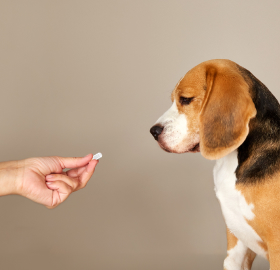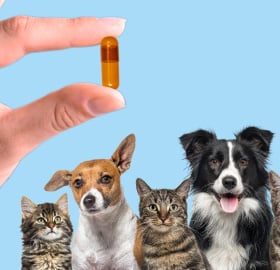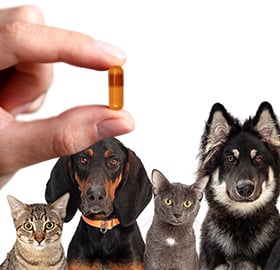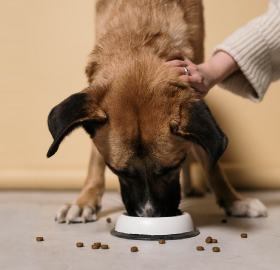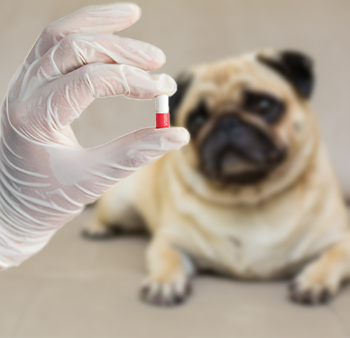Interest in cat and dog gut health has been increasing in tandem with pet owners’ interest in their own gut health. As we have seen before in other nutritional supplement trends, consumers tend to believe that what is important for their own health is important for their pets’ health, too.
What are Pet Probiotics?
Just like probiotics for humans, pet probiotics are live microorganisms. These are the “good” bacteria that can help maintain the beneficial bacteria that reside in the gut microbiome and create microbiome balance.
How Popular are Pet Probiotics?
These products are quite popular. Many consumers are now giving pet probiotics to their furry companions.
What we’ve been seeing is that digestive health for pets in general, including the relationship between gut health and overall health, and the role that probiotics can play in this, is a topic of both medical and consumer research. As one of these recent consumer studies showed, 47% of U.S. cat owners and 53% of U.S. dog owners are buying probiotics for dogs and cats.i This is up 213% and 166%, respectively, in just three years!
What’s driving these purchases? Pet owners cite concern for their pets’ general health and wellness, digestive/gut health and veterinarian recommendation as the primary motivators of their decision to give pet probiotics to their dogs and cats.ii
Are Probiotics for Dogs and Cats Effective?
A recent literature review found that the gut microbiota in the digestive system has a significant impact on animal health. In also showed that pet probiotics can have a positive impact on gut microbiome, which in turn can have positive impacts on digestion, immune response and maintaining the integrity of the gastrointestinal barrier.iii Probiotics may “prevent harmful microbial overgrowth, reduce inflation and support nutrient absorption.” They might even serve as alternatives to antibiotics.iv
Research by Chr. Hansen has found that the benefit of probiotics for dogs and cats might go beyond digestive benefits to also impact a pet’s mental health, immune system response, dental health and weight management.v Research by the Purina Institute has found that, due to the gut-brain axis (i.e., the bidirectional communication that occurs between the intestinal tract and the brain), certain pet probiotics can even reduce anxiety in pets and associated anxious behaviors.vi
What’s the Best Oral Dosage Format for Probiotics for Dogs and Cats?
As mentioned above, probiotics are live microorganisms. To be effective, these microorganisms must still be alive when they reach the pet’s intestine – which means they need protection from the harsh acidic environment of the stomach. Encapsulation has been recognized as an effective way to stabilize probiotics in their dried form.vii Although many pet owners are now purchasing pet food that contains probiotics, probiotic capsules have been shown to perform better than non-encapsulated probiotics overall.viii
What are the Ideal Pet Supplement Capsules for Probiotics?
CapsCanada’s K-CAPS® Delayed-Release Capsules are an ideal choice for these types of pet supplement capsules. Made from HPMC, K-CAPS® Delayed-Release Capsules are specially formulated to remain intact until after they pass through the stomach.
A significant benefit of these capsules is that the acid resistance is integrated into the capsule itself. This eliminates the need to add chemicals, phthalates, solvents or additional coatings to the filled capsules. This reduces costs and speeds the manufacturing process.
K-CAPS® delayed-release capsules for pets are available in size 0 and transparent color, and can be custom printed on the body and/or cap.
To request samples, contact with an expert at contact@capscanada.com
References
- i Phillips-Donaldson, Debbie, “Pet probiotics rising, driven by health, functional focus,” Petfood Industry, July 2, 2024.
- ii ibid
- iii Atuahene, D., Mukarram, S.A., et al, “Gut Health Optimization in Canines and Felines: Exploring the Role of Probiotics and Nutraceuticals,” Pets 2024 1(2), 135-151.
- iv Wall, Tim, “Probiotics and nutraceuticals affect dog, cat microbiomes,” Petfood Industry, October 11, 2024.
- v Hardt, Alyssa, “Exploring the growing role of probiotics in pet wellness,” Petfood Industry, April 4, 2024.
- vi The Purina Institute, “Stress-Related Behavioral Disorders.”
- vii Yoha, KS; Nida, Sundus; et al, “Targeted Delivery of Probiotics: Perspectives on Research and Commercialization,” Probiotics Antimicrob Proteins, 2022 Feb;14(1):15-48.






